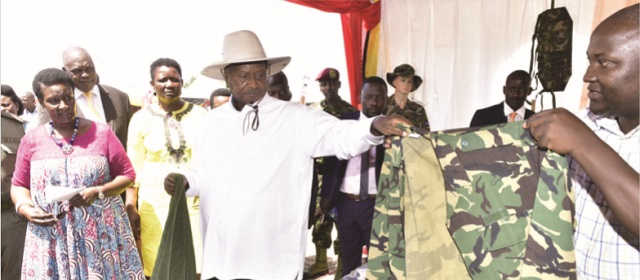
Amelia Kyambadde, the Minister for Trade, Industry and Cooperatives, has made no secret of her ‘Buy Uganda Build Uganda’ initiative.
Kampala, Uganda | ISAAC KHISA | She took another step on March 07 to promote the country’s manufactured products with the launch of a three-day first expo and online portal at the Kololo Independence Grounds targeting locally manufactured products amidst criticism.
The country’s manufacturing sector contributes between 7-10% to the Gross Domestic Product and 40% of the private sector jobs yet has been growing at an average of 10% for the last three decades.
The campaign of BUBU follows the coming into force of the policy in 2017 that instructs government agencies to maximise local procurement of various products and services including cement, steel, and furniture among others.
Kyambadde, who was accompanied by President Yoweri Museveni, Finance Minister, Matia Kasaija and manufacturers during the expo launch, said BUBU is a landmark policy whose successful implementation will contribute to the growth of local industries and related opportunities.
“Local companies have supplied local products worth Shs141bn to Petroleum Authority of Uganda while Uganda prisons, Uganda People’s Defence Forces, Police and medical personnel procure uniforms from Nytil,” she said.
For that, Kyambadde revealed that local procurement of various products has seen the country’s trade deficit reduce from US$3,261bn in 2015 to US$2,694bn in 2017 while trade balance between Uganda and the East African region increased from US$181million in 2016 to US$266million in 2017.
“Our trade balance with our major East African partner, Kenya, registered improvement from trade deficit of US$54million in 2016 to US$94million in 2017,” she said.
Kyambadde lashed at the BUBU critics saying the initiative does not apply to only Uganda.
She said many other countries within and outside the region have been implementing similar arrangements.
“We have Proud South African Campaign, Made in Australia Campaign, Buy Kenya Build Kenya, Buy Africa Build Africa, Proudly British Campaign, and most recently, Buy America Hire America,” she said.
However, Kyambadde, said there remains a number of challenges including mindset change towards local goods and services, gaps in legal frameworks and access to credit.
Barbra Mulwana, the chairperson of Uganda Manufacturers’ Association said that BUBU has started to bear fruits to the local manufacturing firms.
“Since operationalisation of BUBU, private sector players have been able to supply to the public sector with various products including cement, steel, and cable. This has led to improvement in capacity utilisation from 53% to 60%,” she said.
Mulwana, however decried of delayed payments, a situation she says limits their cash flows and growth of companies.
Mulwana’s speech prompted Kasaija [Finance Minister] to announce that the government has prioritised the payment of all arrears due to local suppliers in the current and new budgets.
“We are going to allocate money in the budget to pay off all the local suppliers because we know by delaying the money it is affecting your cash flow and that is not good,” he said.
This comes as the Bank of Uganda has in the previous fora consistently stated that most countries have developed rapidly, achieved sustained and rapid growth and the structural transformation of their economies through outward-looking policies other than the inward-looking policies.
“It is participation in export markets which provides the main stimulus for productivity gains and technological upgrading in developing countries,” BoU Governor Emmanuel Tumusiime Mutebile said in one of the events organised by the trade ministry.
“The Buy Uganda, Build Uganda campaign and the export promotion strategy are not mutually compatible. We can choose one or the other, and not both.”
He said Uganda should adopt an export promotion strategy to give exporters incentives to maximise their production.
President Museveni said the government will continue to support the BUBU concept, having dealt with the issue of security and electricity.
“We are working on the railway to lower the cost of transport. We are also working on lowering the cost of money. We still have gaps but at least we are not sitting back as before,” he said.
“I have seen some people making shoes though the leather is imported. I have seen people making pharmaceutical products, although they are using imported sugars. I have seen others making furniture – and these ones are doing well because they are using trees grown locally– and wines from bananas. I thank you because we are waking up.”
****
 The Independent Uganda: You get the Truth we Pay the Price
The Independent Uganda: You get the Truth we Pay the Price


